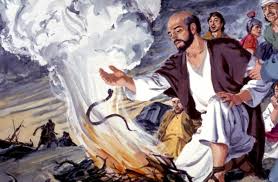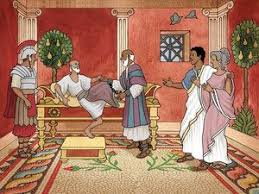Paul Ashore at Malta
28: 1-10
Late 59 AD
Paul ashore at Malta DIG: In light of the fact that God wanted Paul to get to Rome, why do you think He allowed all the events of 27:1 to 28:9 to take place? What stories might the centurion tell his fellow officers once they arrive? How might this set the stage for Paul to write about how the way imprisonment at Rome served to advance the gospel (Philippians 1:12-13)? How do you see Acts 1:8 still being carried out?
REFLECT: How has God used a disaster in your life for ministry? What have you learned from it? Don’t think for a minute that people aren’t curious about God, knowing deep inside that He exists and will in some way determine their eternal destiny. How have you seen any evidence of this in different people you have known? What might be some of the reasons why ADONAI has chosen to reveal Himself in this way, not knocking people over the head, but leaving traces throughout their lifetime? We have all seen enough concert footage and sporting events to know what adulation looks like. But how should a servant of God handle it when we are given recognition? What has to change inside your heart before you can truly brag on God, before you can take your own contribution out of the mix and genuinely give Him all the glory?
Acts 28 opens with Paul on the Mediterranean island of Malta. He had left Caesarea more than two months earlier, bound from Rome to have his appeal heard by the emperor. In a risky attempt to reach a more favorable harbor on Crete to winter in, the apostle’s ship had been caught in the dreaded “Northeaster.” That violent storm had driven the ship for fourteen terror-filled days across the Mediterranean to Malta. There the crew attempted to beach the ship, but it ran aground and was destroyed by the pounding surf. Miraculously, all 276 persons on board managed to reach the shore safely. God had promised Paul that although the ship would be destroyed, no lives would be lost (27:22). He had also promised that the ship would run aground on an island (27:26). Both promises were fulfilled when the ship reached Malta.632
Once having made it safely through the breakers to ashore, we (to see link click Bx – Paul’s Vision of the Man of Macedonia: A closer look at the “us” or “we” passages and sea passages) learned that the island was called Malta (28:1). A small island only 18 miles long and 8 miles wide, it lies about 58 miles south of Sicily and 180 miles northeast of the coast of Africa. The latter is important because it was colonized by the Phoenicians about 1,000 BC, apparently from their base in Africa. Even in Paul’s day the vernacular language was still a Punic or Carthaginian dialect, though clearly some Greek and Latin were also spoken there as well, primarily by Rome’s representatives and the various Greek and Roman settlers who had come to live there over the generations. In fact, most of the inscriptions that have been found on the island are in Greek or Latin. This suggests that the islanders would have been perfectly capable of speaking to these shipwrecked travelers in Greek, though most likely they spoke in Punic among themselves.633
The natives continually showed us unusual kindness. Luke’s use of the word natives to describe the people of Malta does not mean they were primitive of uncivilized, but merely suggests a people whose native language was not Greek or Latin. The reaction of the Maltese to their unexpected visitors proves that they were anything but uncivilized because when it had started raining and it was cold, they kindled a fire and welcomed us all (28:1-2). Exhausted from their long ordeal, soaked from their swim to shore, drenched from the driving rain, and chilled by the cold November wind, they welcomed a fire to warm themselves.
The snake incident: Wood needed to be added continually to the fire to keep it from going out. Paul’s servant heart was evident as he gathered a bundle of brushwood and placed it on the fire. But a viper came out because of the heat, bit Paul and fastened on his hand. When the natives saw the snake hanging from his hand, they began saying to one another, “No doubt this man is a murderer! Though he has been saved from the sea, Justice has not allowed him to live” (28:3-4) The islanders, knowing Paul was a prisoner, assumed that he had committed some great crime, and the Geek goddess of justice, Dikee, would not permit Paul to go on living.

However, God didn’t preserve Paul from the storm just to let him die by a snake. He shook the snake off into the fire and suffered no harm. They were expecting Paul’s hand to swell up or suddenly fall down dead – but after they waited a long time they saw no harm come to him (28:5-6a). Paul was protected. It was promised that he would go to Rome and witness before Caesar (23:11; 27:24), and Paul wasn’t at Rome yet. It wasn’t so much that nothing could stop Paul as it was that nothing could stop God’s promise from being fulfilled. Paul could take God’s past faithfulness as a promise of future blessing and protection. Moreover, Divine Justice had no more claim against Paul because it had all been fully satisfied by Yeshua’s death and resurrection. And if you are a believer, all of your sins have also been paid for on the cross.634
When Paul did not drop dead, they changed their minds and began to say he was a god (28:6b). One is surprised how quickly Luke concludes this incident. On an earlier occasion, when Cornelius sought to worship Peter, the apostle corrected him immediately (see Bg – Peter Goes to the House of Cornelius); and when the natives of Lystra hailed Paul and Barnabas as gods, Paul quickly set them straight (see Bq – Paul’s Message in Lystra). The reader of Acts needs no reminder that the response of the Maltese was inappropriate. Rather, by ending on their acclamation that Paul was a god, Luke emphasized another point altogether – namely that Paul was thoroughly under the protection of God. Whether a storm at sea or a viper on land, he was saved from every life-threatening danger. Protection from the storm and the viper were both acts of divine providence; both were miraculous.635
The healing of Publius’ father: This is a miracle story, of the same kind as is related in the gospels, and it bears some resemblance to the story of how Yeshua healed Peter’s mother-in-law and then a crowd of other sick people (see the commentary on The Life of Christ Cl – Simon’s Mother-in-Law Was in Bed with a High Fever).636 Now in the vicinity around that place were lands belonging to the most prominent man of the island, named Publius. As his title the leading man of the island indicates, Publius was the Roman governor of Malta. Luke indicates that he graciously welcomed all 276 persons and hosted us warmly for three days until we could make arrangements for winter quarters (28:7).

ADONAI often rewards acts of kindness to His people (Genesis 12:3; Matthew 10:40-42, 25:31ff), and Paul was able to repay Publius for his hospitality. It so happened that the father of Publius was lying in bed sick with intermittent attacks of fever and dysentery. The micro-organism, which caused it, was identified in 1887 and traced to the milk of Maltese goats. The fever and dysentery could last for months or even years.637 Paul visited Publius’ father and when he had prayed and laid hands on him, he healed him (Greek: iasato meaning instantly), just like Yeshua did (Matthew 8:8, 13:15, 15:28, Mark 5:23, 16:18; Luke 6:19, 9:42, 14:4; John 4:47, 5:13), although there is no set formula (see Ap – Peter Heals a Lame Beggar: A Closer Look at Miracles in Acts) . After this happened, the rest of the sick on the island started coming to Paul for healing (28:8-9). Although Luke does not mention it, Paul undoubtedly preached the gospel to the Maltese, since the purpose of miracles was to authenticate him as God’s messenger. According to tradition, the church on Malta dates from this time, with Publius as its first pastor.638
After three months (28:11) of winter at Malta, Paul and his companions were finally ready to leave. With sea travel beginning again, Julius was able to arrange transport to Italy for his soldiers and prisoners. Paul fondly remembered that when we left, the Maltese also heaped honors on us; and when we sailed, they put on board all the supplies we needed (28:10). Since they had lost everything in the shipwreck, the passengers were grateful to have their needs supplied. The hospitality of the Maltese would stand in stark contrast with the reception Paul found from the Jews of Rome.639
When God performed His awesome, miraculous work on the island of Malta, healing all the sick, I believe His main purpose was to meet their spiritual needs. Three details suggest God worked in the physical realm for spiritual purposes.
The first thing Paul did before he healed Publius’ father was to pray, not wanting the Maltese to think he was a god. Prayer helped redirect their attention to the source of all healing – Jesus Christ, the Great Physician.
The second detail that suggests God used physical needs to shed light on spiritual realities was the means of healing. He used Paul to heal, yet Luke was a physician. Why? I believe God wanted the Maltese to recognize God (instead of some well-educated professional) as the source of their healing. No doubt God used Luke many times to tend to the sick, but when He wanted to leave no room for doubt, He used someone with no knowledge of medicine.
The last detail that suggests God was up to something spiritual was that Paul, just like Yeshua, healed all who came to him. Sadly, an evangelist may not pack the house with good preaching and Spirit-filled worship, but he can draw large crowds with rumors of healing. Yes, God cares about the sick. And He often heals physical illness in His own way, in His own time, but never in the Scriptures had a man brought healing to an entire land. God used the physical needs of those in Malta to draw attention to the only One who could meet their spiritual needs. He trusted Paul not to take credit for a work only God could do.
We, too, must be careful to give God the glory when He uses us to accomplish things only He can do. Every time you exercise a spiritual gift, God is accomplishing His work through you. If you are a servant of God and you have known Him long, He has used you to do something only He can do.
Not to us, ADONAI, not to us, but to Your Name be the glory – because of Your faithfulness. Why should the nations say, “Where is their God” (Psalm 115:1-2)? May they say instead that they see You in us, that they know Your love by knowing Your children. Please LORD, make known to the nations this glorious wealth of the gospel, which is Christ in us, the hope of glory (Colossians 1:27).640



Leave A Comment